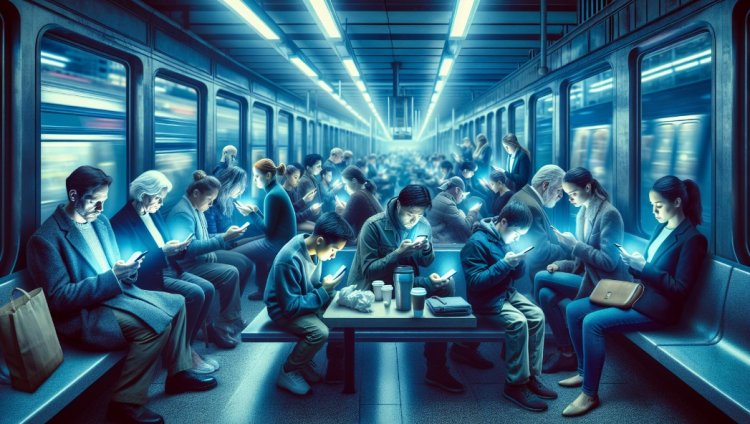Understanding the Loneliness Epidemic: Causes and Solutions
Feeling isolated and alone? You're not alone. Learn about the alarming rise in loneliness, its root causes, and potential solutions to combat this global issue.

The rise of loneliness
Have you ever noticed that when people are in public places, they often spend more time looking at their smartphones instead of talking to each other? In our modern society, it's become quite common to see people sitting together but each looking at their own screens. This image shows individuals riding together but not really interacting with each other, as their eyes are focused on the glow coming from their screens. Have you ever noticed that fewer people are having conversations with each other when they are out in public? Why do many people like looking at their smartphone screens even though they emit dim light? The loneliness epidemic is a problem that is getting worse and needs us to pay attention to it.
In this blog, we will talk about what loneliness means, where it comes from, why it happens, and who tends to experience it the most. Don't worry, because we will also talk about some simple ways to fight against feeling lonely.
Understanding Loneliness
Loneliness doesn't just happen when you're by yourself. Loneliness is a feeling that happens when someone doesn't feel connected to others, even if there are people around them. Neuroscientists say that loneliness is like being on high alert all the time. It's a feeling of not feeling safe and not being happy with the way we interact with other people. It's like a signal that your brain sends when you're feeling emotional pain, and it tells you that you should find someone to talk to about how you're feeling. Loneliness is a feeling that can come and go, kind of like when you feel hungry. Sometimes, it's just a temporary feeling that doesn't last very long. But other times, it can stick around for a long time and become chronic. When loneliness becomes chronic, it can make you feel anxious, sad, and even angry.
The Loneliness Epidemic
In the past few years, people have been talking a lot about the loneliness epidemic. Health experts are concerned because they say that feeling lonely can be just as bad for your health as smoking 15 cigarettes every day. Loneliness can be connected to different health problems like heart disease, stroke, and dementia. Loneliness is something that can affect people of all ages and backgrounds, both men and women. However, it seems that younger people, especially those in Generation Z, are saying that they feel lonely more often.
The origins of loneliness
The problem of loneliness has been growing gradually over time and didn't suddenly appear out of nowhere. This thing we're talking about started because of changes that happened in society during the 1960s and '70s. During that time, the social movements made people focus more on things happening in the whole country than just in their own neighbourhoods. This made local communities seem less important. Because of this, people stopped getting together and participating in groups, which made it harder for them to make friends and caused them to feel more alone. In the 1970s, there was a big increase in people wanting to be independent and do things their own way. However, this also led to more crime happening and families not being as close as they used to be. All of these things together made more people feel really lonely.
The Impact of Modern Society
In the 21st century, people have become more focused on themselves and their own interests. At the same time, technology has been improving very quickly. These two things together have made the problem of feeling lonely even worse. Social media is a tool that helps people connect with each other easily. However, sometimes using social media can make people feel lonely and like they're not having real conversations with others. Smartphones are devices that many people use all the time. They have features that are designed to keep us interested and make us want to use them more. These features are like personalized suggestions that are based on what we like. But because of this, people are spending more time on their phones and less time with other people in real life. This can make it harder for them to make and keep relationships with others.
The role of economics
Economics is also important when it comes to understanding the loneliness problem that many people are facing. Many people are having a hard time managing their money because the economy is not doing well. Prices for things are going up, but people's salaries are staying the same. This means that it's harder to pay for everything they need. Additionally, many people owe a lot of money, which makes it even more difficult to make their income cover all their expenses. When people have to work for a long time and have more than one job, they don't have much time, money, or energy to spend on social activities. When the economy is not stable, it can make people feel lonely. This is because when people are going through financial difficulties, they often feel like they are not connected to others.
The Impact on Young People
Contrary to what many people think, it is actually the younger generation that is experiencing loneliness the most these days. A lot of young people have a hard time making real friendships and often feel sad and alone. There are videos on YouTube and in online forums where people talk about not having any friends. These videos and forums show how much this problem affects young people. Research has found that young people feel lonely at similar rates as older people. In fact, a significant number of young individuals between the ages of 18 and 25, around 61%, experience deep feelings of loneliness.
Loneliness Across the Globe
The problem of loneliness is not something that only affects certain countries or areas. It can be found everywhere. No matter where they live, people can experience loneliness. It can make people feel alone and sad, and it can happen to anyone, no matter how old they are. Some countries, like Brazil, India, and Saudi Arabia, have more people who feel lonely compared to other countries like Germany, the Netherlands, and Russia, where fewer people feel lonely. The COVID-19 pandemic has made people feel even more lonely because the actions taken by the government to control the virus have made it harder for people to spend time with others.
Combatting Loneliness: Solutions
While loneliness poses a complex challenge, there are ways to combat it and foster meaningful connections:
-
Reach out: Seek professional help or express your feelings to friends and family. Start small and find local groups or organisations that can help you connect with others.
-
Cultivate Self-Acceptance: Develop a connection with yourself through self-reflection and self-compassion. Remind yourself of your self-worth and practice self-acceptance.
-
Practice gratitude: Focus on what you have rather than what you lack. Incorporate a daily practice of gratitude to rewire your brain for positivity and contentment.
-
Reduce Social Media Use: Limit your time on social media platforms and choose ones that foster authentic connections rather than superficial interactions.
-
Give to Others: Engage in acts of kindness and generosity. Giving to others helps us recognise our value and contributes to a sense of purpose and connection.
-
Cultivate Connection: Make an effort to connect with others, even with small gestures like saying hello to neighbours. Join local groups or create your own support network.
A Call for Change
To address the problem of many people feeling lonely, we need to work on it both as individuals and as a society. This means that each person should make an effort to connect with others and find ways to feel less lonely. At the same time, we need to make changes in our society to create an environment where people can feel more connected and supported. Governments should focus on doing things that encourage people to get involved in their communities, make it easier for people to get help with their mental health, and spend money on making housing more affordable. It's really important to create places where people can come together and spend time with each other. If we show that we care about others, have sympathy for their feelings, and try to understand them, we can help with the problem of many people feeling lonely. This can help create a society where people have strong relationships with each other.
Loneliness is when people feel alone and disconnected from others, which isn't how humans are meant to feel. We need to make sure we spend time with others and try to help people who are feeling lonely. If we follow the ideas and suggestions given and speak up for change, we can turn things around and make a society where people feel more connected and caring towards each other.
Just a reminder: if you come across someone who seems lonely and is showing signs of feeling alone, it's important not to ignore them. If someone is going through a tough time, you can offer your support by reaching out to them and being there to listen to their concerns. If their situation seems serious, it's important to encourage them to seek help from a professional. If we work together, we can have a positive impact and make a world where nobody feels lonely.
I appreciate you taking the time to read this blog about the loneliness epidemic. If you have any stories or thoughts from your own life that you'd like to share, please write them in the comments section at the bottom of the page. Sure, let's have a chat and try to create a future where people are more closely connected.
Stay connected,
Abe Abrams



 admin
admin 










